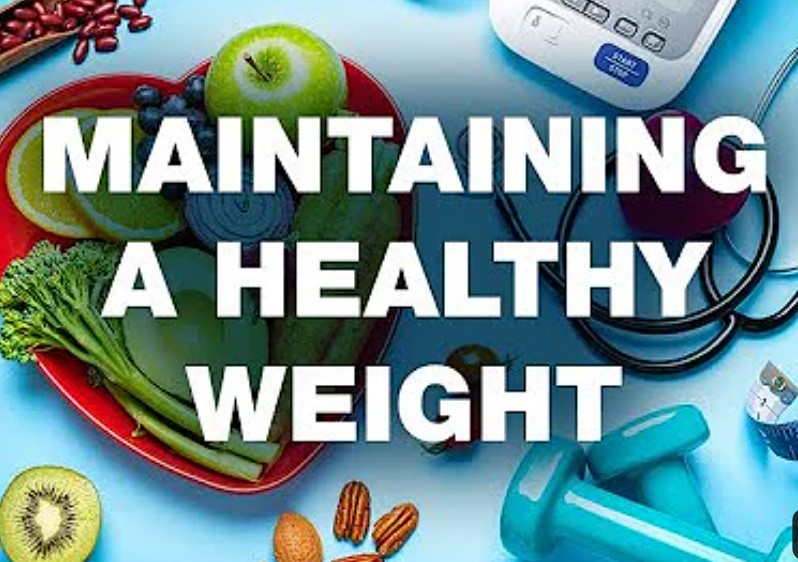Ways of Maintaining a Good Body Weight

Maintaining a Good Body Weight
Maintaining a good body weight includes healthy eating, physical activity, optimal sleep, and stress reduction. Several other factors may also affect weight gain. Healthy eating features a variety of healthy foods
Here are some tips to help you maintain a healthy weight:
1. Watch your portion sizes
Eating smaller portions can help you avoid eating too much food and allow you to include more of the foods you love in your daily life. The American Heart Association reminds people that portion sizes are different than serving sizes, and you can learn more about the differences between the two here.
2. Eat good foods
Foods high in sugar and calories lead to weight gain if you are not careful. Choose foods that are high in nutrition and taste, like fruits, vegetables, and whole grains. You don’t have to sacrifice your favourite foods to take care of your body either–it’s ok to have a couple of cheat meals or cheat days every once in a while.
3. Drink more water
Drinking water, along with eating good foods and exercising daily, can help you to maintain a healthy weight. According to the Obesity Society, drinking water daily can also shrink your waistline and change your body fat percentage over time.
4. Track what you eat
Many people are unaware of exactly how many calories they consume, which is why it’s important to track and monitor the total calories you eat and drink each day. If you want to lose weight, you must burn more calories than you eat or drink. Visit the Dietary Guidelines for Americans 2015-2020 chart to see how many calories you need to eat to maintain or lose weight.
5. Exercise daily
Your body weight is affected by the amount of energy you take in and the amount you use. If you want to maintain your current body weight, you will need to use as much energy as you consume; to lose weight, you need to use more energy than you consume. Find a good exercise program that includes both cardio and strength training. The benefits of daily exercise are more than just keeping your body weight in check; exercise also builds muscle, strengthens your heart, and helps your body to function at its best.
6. Get more sleep
Getting a good amount of sleep every night helps to reset your body, preparing it for the next day. According to the National Institutes of Health, those who don’t get enough sleep often tend to eat more food than they need as a way to stay awake. Make time every day to get enough sleep. Doing so will help you function better throughout the day, and keep you from eating extra. If you have trouble sleeping, find ways to relax your body like yoga, reading, or stretching.
7. Make a goal and stick to it
To accomplish any goal, you need to know where you currently are. Find out your Body Mass Index (BMI) and come up with a plan to stay in the healthy category. If you need some help, you can visit your family doctor or another healthcare provider for advice. It is better to start with small, short-term goals that you know you will be able to accomplish. Doing so will help you to stay on track toward your long-term goals.
A good way to gain weight if you’re underweight
- Slowly begin to eat 5 to 6 smaller meals during the day. Try to tune into your body to recognize when you might be hungry. But you may need to plan times to eat even if you aren’t that hungry.
- Set up a routine to eat and drink things you like that have a lot of nutrients as well as calories. Talk with your health care provider or dietitian about how many calories to eat a day or in each meal. You also can ask how many servings you should eat of the different food groups.
- Add extras to your dishes for more calories, such as cheese in casseroles or nut butter on whole-grain toast. You also can add dry milk or liquid milk to foods for extra protein and calories. Some examples are mashed potatoes or soups.
- Try smoothies and shakes Avoid beverages with few nutrients or calories, such as diet soda. But a blend of high-calorie, nutritious ingredients in a smoothie or shake can help if you’re eating on the go. Meal replacement drinks also may be part of your weight-gain effort.
- Beverages can make you feel full. If that’s the case for you, avoid drinking during a meal or before. But make sure you are drinking enough throughout the day.
- Exercise, especially strength training, can help you gain weight by building up your muscles. Exercise also may stimulate your appetite.
Ways to lose weight safely:
- People who lose weight gradually and steadily (about 1 to 2 pounds per week) are more successful at keeping weight off. [20] This allows the body to adjust to the change and can lower the risk of developing strong cravings and feelings of deprivation that often accompany more rapid weight loss.
- This includes setting goals such as with the SMART acronym, which stands for Specific, Measurable, Achievable, Relevant, and Time-Bound. Start by creating 2-3 short-term SMART goals. Self-monitoring such as daily or weekly food journaling or using behavior apps can provide insight and accountability for eating behaviors. This category also includes problem-solving, such as having a plan for “relapses” if weight is regained due to stressful life changes, holidays, or job demands.
- Research suggests that having frequent contact with others for support (e.g., a trusted family member or friend, physician, health coach, registered dietitian, or a fellow friend or coworker on a similar healthy weight journey) can be valuable in providing encouragement and accountability.
- Although some researchers have questioned the usefulness of energy balance (calories eaten versus calories expended), current evidence indicates that calorie reduction remains the most effective approach for weight control. There are many dietary strategies (e.g., high-carb low-fat vs. low-carb high-fat vs. intermittent fasting vs. a Mediterranean diet), but research has not consistently shown greater weight loss with one plan over another in the long term. The Healthy Eating Plate model which provides balanced nutrition and portion control is a good place to start.
- Do you eat too fast or while distracted watching television or scrolling through your phone? Do you stress-eat or snack even when not hungry? Mindful eating addresses these behaviours that are associated with weight gain. Increasing awareness and appreciation of food can provide greater satisfaction, physically and mentally, that may help reduce overeating.
- Exercise is one component in maintaining a healthy weight and preventing weight gain, but it also plays a key role in well-being and mental health. The National Weight Control Registry, which follows people who have lost and maintained a 30-pound loss for at least one year, shows that participants include about one hour of moderate-vigorous exercise daily such as brisk walking. However, there is variation among participants, with some requiring more exercise and some less to keep the weight off. How much is needed will depend on one’s genes and lifestyle factors. Performing different types of exercises can expand the range of benefits even further.
- In a rushed society with never-ending demands, taking care of our bodies can quickly fall to the bottom of our priority list. Dedicating time to care for one’s emotional, physical, and spiritual needs can promote a healthy weight. Many of the factors listed above are examples of self-care; others could be discovering a new hobby, practising daily meditation, or allowing time to just do nothing. Self-care may help improve mood and a sense of well-being and increase motivation and energy levels. It also cultivates self-compassion and resilience, as one learns to accept their mistakes and move on.





